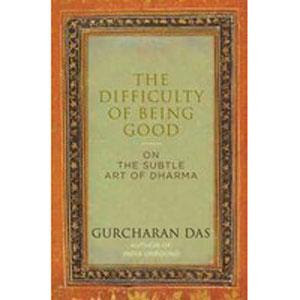The entire book is strewn with words like "perhaps" and "maybe". logical fallacies and repetitions through out the book made me wonder if the book was just supposed to sell after the name of the author"perhaps".
i will give you an example of how the book has tried to make its point.Here the author in below quote is trying to prove that B. Ramalinga Raju of satyam has done whatever he did because of his two sons, like dhritrashtra looked the other way for his son.
So he starts with the premise.he just starts with an assumption.no explanations, just that he felt so.bol font mine.
quote "even as the story was unfolding, it seemed clear to me that the moral failing was not greed as everyone thought. Nor was it duryodhan like hubris, which made raju believe, like investment bankers on wall street, that he was 'Master of Universe'.Was it ,PERHAPS[stress mine],that Raju's stake in satyam had dwindled to 8.6%, and the company was in danger of slipping out of Family's control?Raju has two sons and a sense of filial duty drove him,PERHAPS, to create companies in real estate and infrastructure, two sectors of the Indian economy that had not been reformed, and where politicians insisted on bribes to be paid upfront for the favors delivered."Unquote
Then in the start of his next para, he conveniently forgets that it was only an assumption. all of it, including that he got into the two sectors, right up to the part that the excess money had been given to politicians. No quotations. No references. when the 443 pages book carries approx 25% pages labeled as notesthats close to 100 pages of just bibliography and notes. See how he just goes on, on his assumption in the start of the next para.
quote
"Raju was ruined by his Dhritrashtra-Like weakness for his sons."[page 278.]

Note that there are no interviews in this book. Not even hearsay. Whatever has been quoted has been quoted with appropriate references.And only those lines are the best part, sadly they have not been written by the author, just compiled, and in more instances than not are completely out of context. the general feeling after reading the quote would be, now how was that quote relevant?
Lot of brilliant people's names and lovely quotations are strewn around the book.Completely irrelevant, just thrown in. Also much importance has been given on what the author thinks MIGHT be the reason, without least concern that it can be proved or not. And lots of instances from Mahabharata repeated as often, as i just repeated the above point in two paragraphs, the one about out of context.
Learning from the book, i can safely say, that PERHAPS the author has writing columns for news paper for so long that he can produce such a book overnight, and MAYBE give an impromptu speech of a thousand words on any given subjects. All one needs to do is invoke memories of his or her own upbringing, personal viewpoints unsupported by references of substantiated, and then fill up the gaps with quotes of some religious text.Take up key words, and the Google them for quotes, and where ever some big name pops up, take the quote and paste it anywhere at the end of a sentence. then call up your few friends, and ask them to write a few words. start the book with their opinions, so that the reader thinks twice before blasting the book away.And yeah, don't forget to attract the western crowd with a subtitle .. "the subtle art of dharma"...and don't forget to explain what a sadhu is either.
Hell, i am almost tempted to do a project on ramayana and present it for publishing next month.
Yeah, the book was 700 bucks, and i am damn pissed for i could have bought something useful, and spent my limited time better rather than a confused man's ramblings for commercial praise.